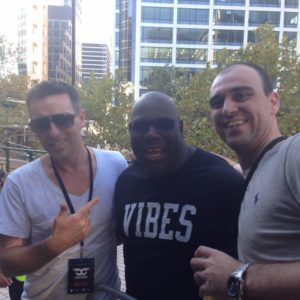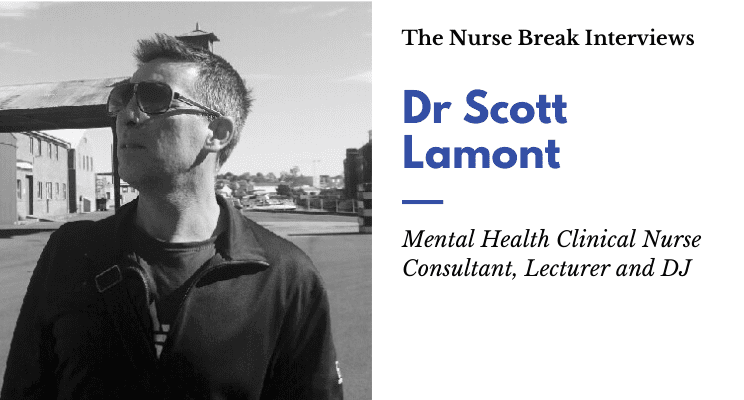Table of Contents
Meet Clinical Nurse Consultant Dr Scott Lamont!
I’m a Clinical Nurse Consultant working in mental health liaison at a tertiary referral hospital in metropolitan Sydney. I’m a member of my local health district Clinical Ethics Committee and I’m also a casual academic at Southern Cross University, teaching in a couple of Master of Healthcare Leadership subjects. I’ve recently, as co-developer, launched an ‘Interview Success for Nurses App’ which we’ve rolled out on Google Play here and the App store (please excuse the plug!).
Away from work, I’m a partner to Sally and father to two boys of 12 & 8. I’m also a DJ (check out the tracks here), event promoter, and radio show host, which pre-COVID involved its fair share of late nights. I’ve enjoyed the recent break but keen to get back. That’s pretty much what keeps me busy.

What has inspired you to work 20+ years in Mental Health?
Thanks, that 20+ is being kind! I’m from a town just outside of sunny Glasgow which had located there an armed forces veteran’s hospital. It was the only one of its kind in the UK and the residents when I worked there were mostly WW1 and WW11 veterans. Like many of my local contemporaries, I worked there during holidays and weekends whilst at school. It paid way more than a paper or milk round and set many of us on a path to being a health professional. It was also an extremely humbling experience that remains with me to this day.
Here I am as a 15/16-year-old studying the horror and futility of WW1 trench warfare in school History, whilst providing basic care to many veterans who stood at the Somme or Passchendaele, but were fortunate enough to get an injury and return home. That experience made me reflect on the value individual’s bring to life and instilled in me a sense of advocacy for those who are perhaps unable to advocate for themselves.
That was my platform to nursing, and I thought that mental health would be interesting, not realising at the time that aspects of who I am were perhaps drawing me to that particular speciality. Fast forward 20+ years, a change of scenery, climate and continent in 2004, and I guess it has never stopped being interesting.
What makes a good mental health nurse?
That’s a tougher question than it first seems. I guess the ‘good’ mental health nurses have a range of qualities and skills which are not necessarily unique to them, but an absence of these will arguably expose them more in the mental health speciality. Those who stand out will be adept at developing person-centred relationships often under challenging circumstances.
They will have an inquiring mind with an ability to look beyond what is in front of them and will have strong critical thinking and pragmatic solution-focused skills. They will also be empathic and resilient, and won’t personalise unhealthy behaviours towards them. They are also likely to regularly engage in reflective practice or clinical supervision, to understand their sense of self, their practice, and how they are perceived by others.
What is a Mental Health Liaison Nurse and what does the role involve?
A mental health liaison nurse, variously known as a consultation-liaison psychiatric nurse or psychiatric liaison nurse, is a term associated with a mental health nurse who works in a non-mental health setting. These settings are generally emergency departments and general hospitals, although extend beyond these. The role typically involves assessment, consultation and planning of care, education, training and support of staff, the advisory capacity to health executives regarding clinical services and planning, quality and safety, and research. It’s a highly interesting, autonomous, and varied role.
What are the main types of patients you see in your current position and what is your role in their care?
The clinical nurse consultant role in NSW has five domains, one of which is clinical. We are involved with patients who have diagnoses of psychotic, mood, and personality disorders. We will also see patients who have dementia, delirium, and substance misuse issues. My colleague and I also coordinate our hospital ‘code black’ response within hours, so we see a range of people who are distressed or angry for a variety of different reasons.
You are also a PhD graduate. Can you talk about what nursing research involves, why is it so important and what advice do you have for a nurse wanting to do a PhD?
Nursing needs to embrace research and not view it as an ‘extracurricular’ activity that nurse researchers or academics are responsible for. Research is embedded within Standard 1 of our competency standards, and evidence should underpin all routine practice. As a nurse, I regularly evaluate and publish aspects of my practice as we have a professional and fiscal responsibility to demonstrate that what we do meets desired outcomes, and is cost-effective.
I would advise anyone wishing to take that journey to find a topic they are passionate about, and scope out potential supervisors to find those who are equally as passionate about your topic as you are, and whom you also warm to. It’s a lengthy journey so those aspects need to be right. I’d also recommend finding a research ‘buddy’ for peer-support along the way, ideally, someone else undertaking a PhD.
What is one myth or the common misconception that you want to debunk about your area?
The obvious one here is that persons with a mental illness are dangerous, when in fact they are more likely to be victims of violence than perpetrators of it. However, given mental health nursing globally is experiencing a desirability or popularity issue, I’d like to debunk the perception that it’s not ‘real nursing’ or mental health nurses are ‘lazy’ (sorry, I’ve turned one myth into three). In short, you don’t have to be on your feet and physically active all day to be ‘busy’. As mentioned earlier, mental health nursing is highly specialised, albeit different.
Why should nurses consider mental health as a career choice?
If you are a people person it affords you the opportunity to develop therapeutic relationships with people over considerable periods of time to support their wellbeing and recovery, and enable them to lead their care, or at the very least be active participants in their care. Contrary to popular belief, we don’t concentrate solely on a person’s mental wellbeing. There is also a strong interconnected focus on a person’s physical, social, and spiritual wellbeing – a ‘whole of person’ approach so to speak.
We are present during stability, transition, and crisis periods, which further add to the complexity and diversity of the role. The role also involves health promotion, advocacy, and networking with a broad range of stakeholders and care providers. It is a highly diverse, interesting, and rewarding career. A career in mental health nursing brings with it incredible responsibility, which many people thrive upon. We also tend to be more fun at the pub!
Consent, capacity and legal aspects nurses should think about when caring for delirious/confused patients?
I could write all day about this. Essentially, nurses, and all health professionals for that matter, must be cognisant with legislation which is relevant to their professional practice. There is a well-known phrase in law which contextualises this nicely: ‘ignorantia legis neminem excusat’ (Latin for ignorance of the law excuses no one). As a health professional, you can be excused for not being cognisant with environmental law or business law, but not so mental health law (if working in mental health) or guardianship law (if working in areas of health where patients have impaired decision-making capacity).
Ditto, the requirements in law for a consent to be valid, and impaired decision-making capacity. Inadequate understanding of the law, which unfortunately is highly prevalent, can result in human rights infringements and ‘wrongs’. Consequently, this could result in civil and criminal liability for healthcare professionals and the organisations they work within.
What is one thing you wish you would have known before you started your career in this field?
Perhaps that I knew the value of rigorous research, as I may have pursued this aspect of my personal and professional development sooner. Having said that, I don’t lament any aspect of my career and I don’t have any regrets.
What are the most rewarding and difficult aspects of your area of work?
Receiving acknowledgement, praise, or thanks never gets boring or tiring, whether it be from a patient, their family, or a colleague. I still get a buzz from every journal article or book chapter that gets accepted for publication. Hospitals and health services are complex organisations with lots of moving parts. Navigating the complexities can be difficult and challenging, and I’m a little impatient when it comes to change. Mental health care is also afforded little weighting in the grand scheme of healthcare, which compromises funding, resources, support, innovation etc. Mental health innovation also moves at a slow pace.
What pathway would you like to see the future of mental health nursing take over the next 10 years?
Great question! As Maden eloquently explained, “In this world of breakthroughs and bombshells, psychiatry is the hick town where nothing happens”. I’d like to see more innovation and greater use of technology. One of the positives to emerge from COVID is that we are less reliant on physically being in the same room to perform assessments, share information, and to deliver education and therapy.
There has never been a better time to look at our model of access to mental health services and specialists, and many of the psychological therapies and supports necessary to reduce distress, build resilience, promote recovery, and empower consumers etc. can be delivered in an online format to a larger number of people. I think we can be smarter and embrace the future.
What are some great resources that have helped you along the way? Or what have you listened to or read recently that have inspired you?
With my interest in law and ethics, I couldn’t be without the following texts: Law for Nurses & Midwives by Staunton & Chiarella, and Ethics and Law for the Health Professions by Kerridge, Lowe, & Stewart. Two of the co-authors of those books were my PhD supervisors (Mary Chiarella and Cameron Stewart) and I sit on an ethics committee with Ian Kerridge. They are fantastic texts and I still regularly refer to them. I’m not a podcast person unfortunately, spending most of those opportunities listening to mixes and sourcing new music.
Who are the 3 people who have been most influential to you and why?
My colleague, and co-researcher, Scott Brunero has influenced a major part of my recent professional history. I mentioned in an earlier question the importance of having a research buddy and he would be mine. We publish a lot together and undertook our PhDs around the same time. I must also mention another recent colleague Greg Fairbrother, who is a brilliant researcher. Had I not met him; I may never have taken the research path that I have. In my formal professional years in Glasgow, a manager and mentor (Anne-Marie McGill) was a great role model who influenced my early leadership development.
How can we work better with other health professionals in the multi-disciplinary environment?
We need to acknowledge and respect our differences, whilst focussing on our common goals. We all have a specialised and unique role to play in achieving the desired outcome. We need to be clear regarding the roles and functions of each other and have transparent and consistent communication structures and processes. Regular MDT business meetings and supervision sessions help in this regard.
Are you an Aussie healthcare professional who would like to write about your area of speciality or other nursing/health related content then please email Jackson at thenursebreak@gmail.com to discuss further or check out the Write for TNB Info Page.






You must be logged in to post a comment.